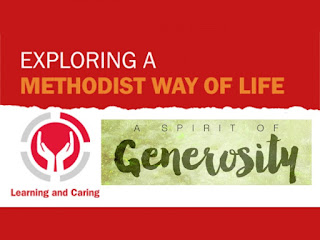The popular Graham Kendrick Hymn, the Servant King, has the phrase that links learning and service with the words, “Then let us learn how to serve.” If we link this with Wesley’s hymn - “To serve the present age, my calling to fulfil, O may it all my powers engage to do my Masters will” - we have in a nutshell the essence of our Calling as disciples.
A Merthodist Way of Life suggest that this should be firstly serve within the context of our immediate communities but also have a wider dimension in the world beyond.
One retired minister would often say to his younger serving colleague, “Well now, I’m still trying to figure out how to serve this present age.” Overtime I have increasingly become aware of the significance found in the introduction to the Methodist Covenant Prayer which includes the words, “Christ has many services to be done: some are easy, others are difficult; some bring honour, others bring reproach; some are suitable to our natural inclinations and material interests, others are contrary to both; in some we may please Christ and please ourselves; in others we cannot please Christ except by denying ourselves. Yet the power to do all these things is given to us in Christ, who strengthens us.”
Yet Fred Buechner also suggest that, “The place God calls you to is the place where your deep gladness and the world’s deep hunger meet.”
Christian service is obviously the service of a Christian, and if words have any meaning, it is that the work does or the duty a disciple discharges to another in the character of a servant. That raises four questions:
What is a "servant"?
What are the distinctive marks of a servant?
Whose servant are we, or who is our master? —
What is the nature of the "service" to which Christians, all Christians, are called by God?
We will try to answer these over the next four days
Francis of Assisi points out that, “Great occasions for serving God come seldom, but little ones surround us daily.”
Here is a verse form John 12:26 and a hymn to ponder and reflect today.
“If anyone serves me, he must follow me; and where I am, there will my servant be also. If anyone serves me, the Father will honour him.”
Prayer
How can I better serve thee, Lord,
Thou who hast done so much for me?
Faltering and weak my labour has been;
O that my life may tell for thee!
Chorus
Here at the cross in this sacred hour,
Here at the source of reviving power,
Helpless indeed, I come with my need;
Lord, for thy service, fit me I plead.
Dull are my ears to hear thy voice,
Slow are my hands to work for thee,
Loath are my feet to conquer the steeps
That lead me to my Calvary.
Strength for my weakness, Lord, impart;
Sight for my blindness give to me;
Faith for my doubtings, Lord, I would crave,
That I may serve thee worthily. Bv
Bramwell Coles (1887-1960)














